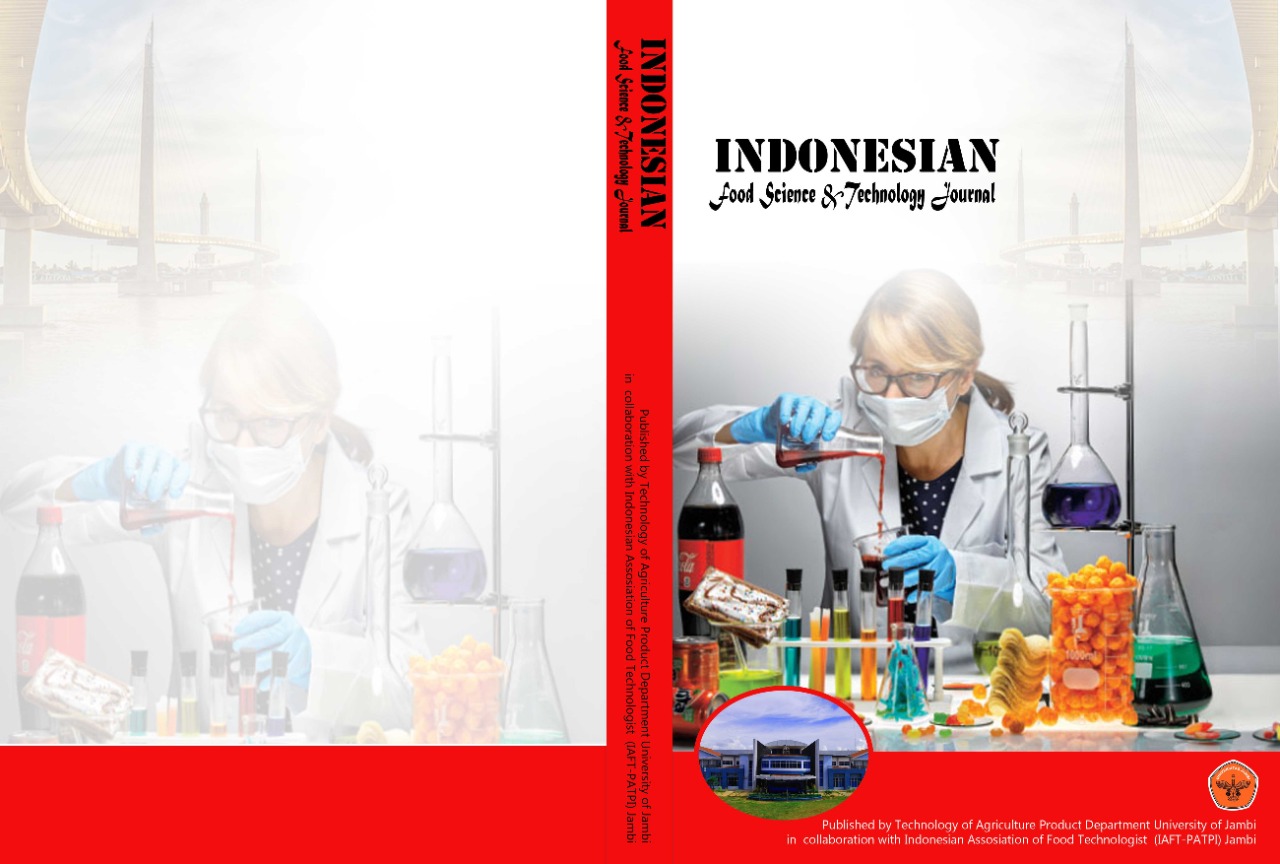Correlation Between Bitterness Removal And Functional Properties Of Papaya (Carica Papaya L.) Leaves
DOI:
https://doi.org/10.22437/ifstj.v5i2.14800Keywords:
Adsorbent, Bitterness Removal, Antioxidant Activity, Antidiabetic ActivityAbstract
The mature papaya leaves are known for its medicinal properties albeit its distinctive bitter taste. In this research 3 different adsorbents; bentonite, activated attapulgite and diatomaceous earth were used to reduce the bitterness of the papaya leaves. The adsorbent treated papaya leaves were then analysed for its sensory evaluation in terms of bitterness intensity and phytochemical compounds which include phenolic, flavonoid, tannin and alkaloid compounds and also antioxidant activity. Papaya leaves treated with bentonite had the most reduced bitterness and application of heat treatment further enhance the efficacy of bitterness removal. However the removal of the bitterness also slightly affected the phytochemical compounds and their functional properties. The leaves treated with bentonite by method of boiling was found to be the most effective method in reducing bitterness, with bitterness intensity score of 0.3 out of the original 11.2, while retaining its phytochemical compound; total phenolic content of 10.699 mg GAE/g extract, total flavonoid content of 1.468 mg QE/g extract, total tannin content of 9.423 mg TAE/g extract, total alkaloid content of 1.363% while retained most of its Antioxidant IC50 of 1001.058 ppm and Antidiabetic properties of 642.231 ppm
Downloads
References
K. M. Basalingappa, “Medicinal Uses Of Carica Papaya,†J. Nat. & Ayurvedic Med., Vol. 2, No. 6, 2018, Doi: 10.23880/Jonam-16000144.
Q. Noshad, “Investigations Of Phytochemical And Antifungal Activity Of Carica Papaya L. Leaves,†Pure Appl. Biol., Vol. 7, No. 1, 2018, Doi: 10.19045/Bspab.2018.70037.
V. L. Maruthanila, R. Elancheran, And S. Mirunalini, “Carica Papaya Leaves And Cancer Prevention: An Overview,†Mini-Reviews Med. Chem., Vol. 20, 2020, Doi: 10.2174/1389557520666200811102622.
D. Yuliastuti, W. Y. Sari, And D. Islamiyati, “Skrining Fitokimia Ekstrak Dan Fraksi Etanol 70% Daging Buah Pepaya (Carica Papaya L.),†Media Inf., Vol. 15, No. 2, Pp. 110–114, 2020, Doi: 10.37160/Bmi.V15i2.391.
S. N. Syed Amran, N. Zainal Abidin, H. Hashim, And S. I. Zubairi, “Saponin Bitterness Reduction Of Carica Papaya Leaf Extracts Through Adsorption Of Weakly Basic Ion Exchange Resins,†J. Food Qual., Vol. 2018, Pp. 1–11, 2018, Doi: 10.1155/2018/5602729.
M. Djebbar, F. Djafri, M. Bouchekara, And A. Djafri, “Adsorption Of Phenol On Natural Clay,†Appl. Water Sci., Vol. 2, No. 2, Pp. 77–86, 2012, Doi: 10.1007/S13201-012-0031-8.
G. Nas And S. Karatas, “Removal Of Bitterness By Using Of Amberlite In Orange Juices,†Int. J. Electron. Mech. Mechatronics Eng., Vol. 7, No. 2, Pp. 1419–1432, 2017, Doi: 10.17932/Iau.Ijemme.21460604.2017.7/2.1419-1432.
B. Aydeniz Güneşer And E. Yilmaz, “Bitterness Reduction Of Cold Pressed Grapefruit Seed Oil By Adsorbent Treatment,†Eur. J. Lipid Sci. Technol., Vol. 120, No. 5, P. 1700308, 2018, Doi: 10.1002/Ejlt.201700308.
M. Kannan, T. S. Kumar, And M. V Rao, “Antidiabetic And Antioxidant Properties Of Waltheria Indica L., An Ethnomedicinal Plant,†Int. J. Pharma Res. Heal. Sci., Vol. 4, No. 5, Pp. 1376–1384, 2016, Doi: 10.21276/Ijprhs.2016.05.07.
R. K. Yadav, S. K. Srivastava, L. Bahadur, A. M. Lall, And M. Pal, “Antioxidant And Antidiabetic Activity Of Dilleniapentagynaroxb. Fruit Extract,†Ann. Phytomedicine An Int. J., Vol. Vi, No. I, Pp. 121–126, 2017, Doi: 10.21276/Ap.2017.6.1.18.
J. P. Roozen And J. P. Van Buren, “Sensory Analysis Of Bitterness In Apple Wine,†Int. J. Food Sci. & Technol., Vol. 14, No. 3, Pp. 315–320, 2007, Doi: 10.1111/J.1365-2621.1979.Tb00874.X.
S. Kreutzmann, L. P. Christensen, And M. Edelenbos, “Investigation Of Bitterness In Carrots (Daucus Carota L.) Based On Quantitative Chemical And Sensory Analyses,†Lwt - Food Sci. Technol., Vol. 41, No. 2, Pp. 193–205, 2008, Doi: 10.1016/J.Lwt.2007.02.024.
P. Kranz, N. Braun, N. Schulze, And B. Kunz, “Sensory Quality Of Functional Beverages: Bitterness Perception And Bitter Masking Of Olive Leaf Extract Fortified Fruit Smoothies,†J. Food Sci., Vol. 75, No. 6, Pp. S308–S311, 2010, Doi: 10.1111/J.1750-3841.2010.01698.X.
H. Valentová, S. Škrovánková, Z. Panovská, And J. Pokorný, “Determination Of Astringent Taste In Model Solutions And In Beverages,†Czech J. Food Sci., Vol. 19, No. No. 5, Pp. 196–200, 2013, Doi: 10.17221/6607-Cjfs.
J. C. Santamarina, K. Klein, Y.-H. Wang, And E. Prencke, “Specific Surface: Determination And Relevance,†Can. Geotech. J., Vol. 39, Pp. 233–241, 2002.
I. Kobayashi, H. Owada, T. Ishii, And A. Iizuka, “Evaluation Of Specific Surface Area Of Bentonite-Engineered Barriers For Kozeny-Carman Law,†Soils Found., Vol. 57, No. 5, Pp. 683–697, 2017, Doi: Https://Doi.Org/10.1016/J.Sandf.2017.08.001.
S. Richards And A. Bouazza, “Phenol Adsorption In Organo-Modified Basaltic Clay And Bentonite,†Appl. Clay Sci., Vol. 37, No. 1–2, Pp. 133–142, 2007, Doi: 10.1016/J.Clay.2006.11.006.
J. Huang, Y. Liu, And X. Wang, “Selective Adsorption Of Tannin From Flavonoids By Organically Modified Attapulgite Clay,†J. Hazard. Mater., Vol. 160, No. 2–3, Pp. 382–387, 2008, Doi: 10.1016/J.Jhazmat.2008.03.008.
K. Tani, S. Nii, F. Kawaizumi, And K. Takahashi, “Removal Of Dissolved Oil From Aqueous Solution Using Polymer Adsorbent, And Regeneration Characteristics Of Adsorbent.,†Kagaku Kogaku Ronbunshu, Vol. 26, No. 4, Pp. 623–625, 2000, Doi: 10.1252/Kakoronbunshu.26.623.
J. M. Mcrae And J. A. Kennedy, “Wine And Grape Tannin Interactions With Salivary Proteins And Their Impact On Astringency: A Review Of Current Research,†Molecules, Vol. 16, No. 3, Pp. 2348–2364, 2011, Doi: 10.3390/Molecules16032348.
S. Senthilkumaar, P. Kalaamani, And C. Subburaam, “Liquid Phase Adsorption Of Crystal Violet Onto Activated Carbons Derived From Male Flowers Of Coconut Tree,†J. Hazard. Mater., Vol. 136, No. 3, Pp. 800–808, 2006, Doi: 10.1016/J.Jhazmat.2006.01.045.
M. Waseem, S. T. Muntha, M. Nawaz, W. Rehman, M. A. Rehman, And K. H. Shah, “Effect Of Heat Treatment On The Efficient Adsorption Of Cd2+Ions By Nanosized Sio2, Tio2and Their Composite,†Mater. Res. Express, Vol. 4, No. 1, P. 15017, 2017, Doi: 10.1088/2053-1591/Aa55b0.
A. I Airaodion, “Antidiabetic Effect Of Ethanolic Extract Of Carica Papaya Leaves In Alloxan-Induced Diabetic Rats,†Am. J. Biomed. Sci. & Res., Vol. 5, No. 3, Pp. 227–234, 2019, Doi: 10.34297/Ajbsr.2019.05.000917.
Downloads
Published
How to Cite
Issue
Section
License
Copyright (c) 2022 Natania Kam, Jacinta Fanya Setiadi, Hardoko Hardoko, Dela Rosa

This work is licensed under a Creative Commons Attribution 4.0 International License.









